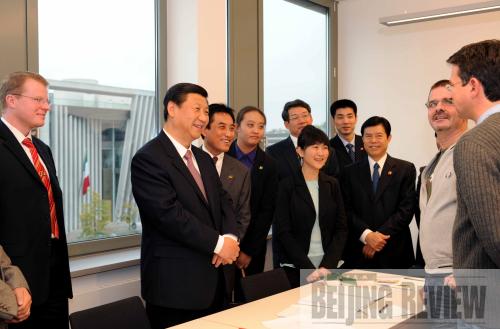|
 |
|
VICE PRESIDENT'S ENCOURAGEMENT: Chinese Vice President Xi Jinping (second left) talks with German students at the Chinese Culture Center in Berlin on October 11 (RAO AIMIN) |
From October 7-21, Chinese Vice President Xi Jinping journeyed to five European countries—Belgium, Germany, Bulgaria, Hungary and Romania—in a distinctively cultural tour.
Not only did he deliver a speech at the prestigious Frankfurt Book Fair in Germany where China was the guest of honor, Xi also inaugurated the Europalia China art festival in Brussels alongside Belgian King Albert II.
The festival, which allows China and Belgium to deepen cultural understandings, will help enhance and deepen mutual understandings, Xi said at the opening ceremony on October 8. Increased development of bilateral relations, added Xi, will most certainly follow.
Indeed, over the next four months, some 50 exhibitions and nearly 500 other events in the realms of the performing arts, literature and cinema will be featured by Chinese artists and artisans in Belgium, the Netherlands, France, Germany and Luxembourg to showcase both traditional and contemporary Chinese culture.
Scores of renowned Chinese musicians, artists, architects and authors, meanwhile, will take part in seminars and other events across Europe.
Cultural exchanges between different countries serve as an "important driving force" for world peace and development, Xi said at the Frankfurt Book Fair.
They are mechanisms with which countries can demonstrate understanding and respect toward each other, while overcoming discrimination and misunderstandings, he said.
Cultural diversity is a hallmark of today's fast-changing world, amid differences in ideologies, social systems and development models. Just as these issues needn't be barriers, cultural exchanges should serve to shore up international harmony.
Moreover, he added, different cultures should learn from each other to make the world more colorful and diversified.
During his meeting with European Commission President Jose Manuel Barroso in Brussels, Xi pledged China's desire to establish a Chinese-European Union (EU) relationship as a role model for peaceful coexistence and friendly exchanges. This partnership, said Xi, could transcend cultures, social systems and development models.
Both sides, he noted, should stick to the principles of "mutual respect and mutual trust, equal consultation, and seeking common ground while shelving differences" in an effort to advance Sino-EU ties.
China and the EU should seek to address disagreements properly and seek new areas of cooperation, while firmly opposing trade and investment protectionism, Xi added.
To further facilitate trade and investment, Xi joined Chinese and European entrepreneurs in business forums held in Belgium, Hungary and Romania. While there, he called on business leaders to work together to explore the potential for economic cooperation.
Chinese entrepreneurs traveling with the vice president signed 93 cooperative agreements and letters of intent worth $7.4 billion with their European counterparts.
In the EU, Belgium is China's seventh biggest trade partner and ninth biggest source of foreign investment. In 2008, bilateral trade volume reached $20.2 billion, up 14.4 percent year on year, according to the Chinese Ministry of Commerce.
| 